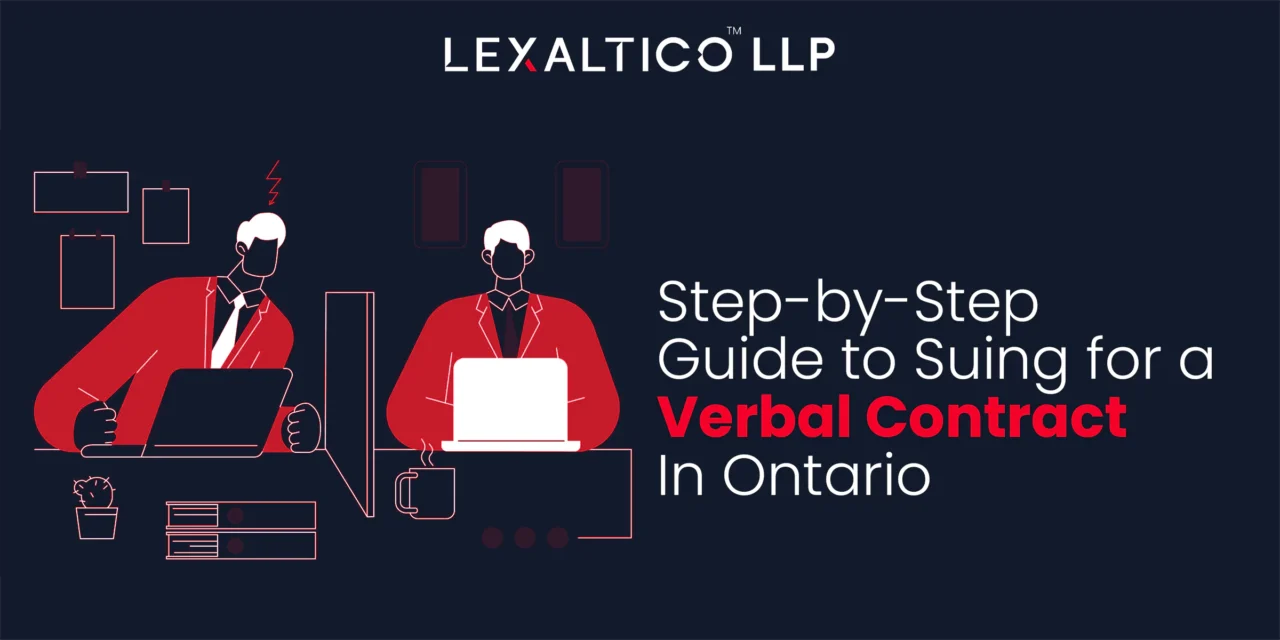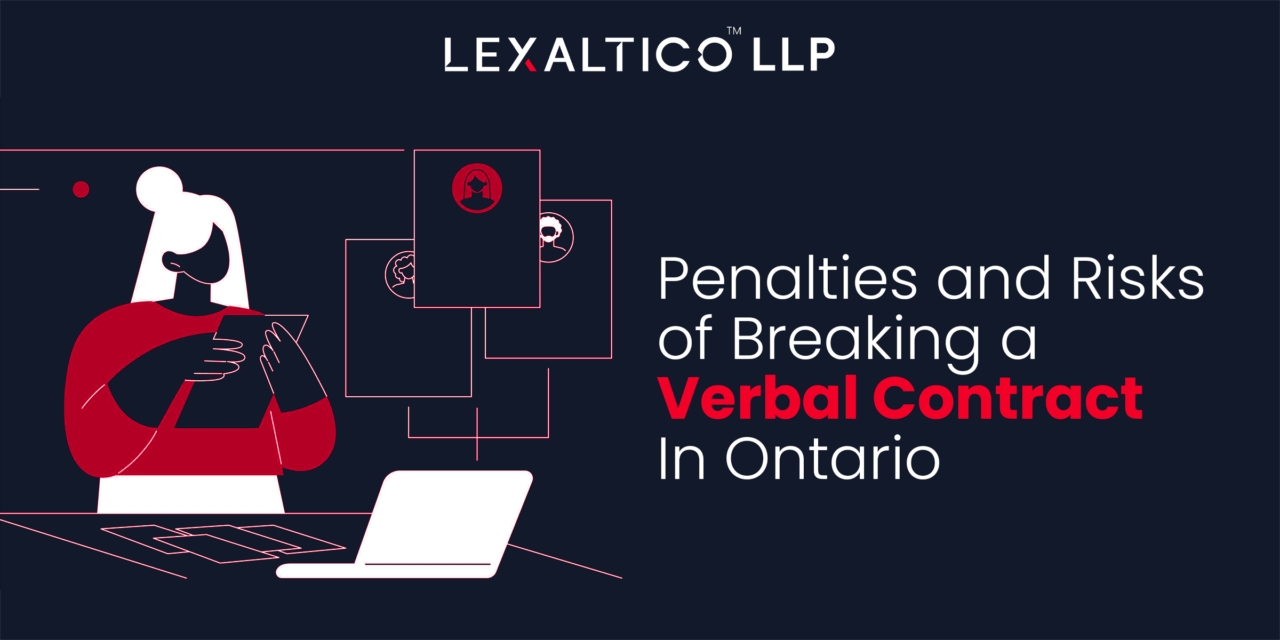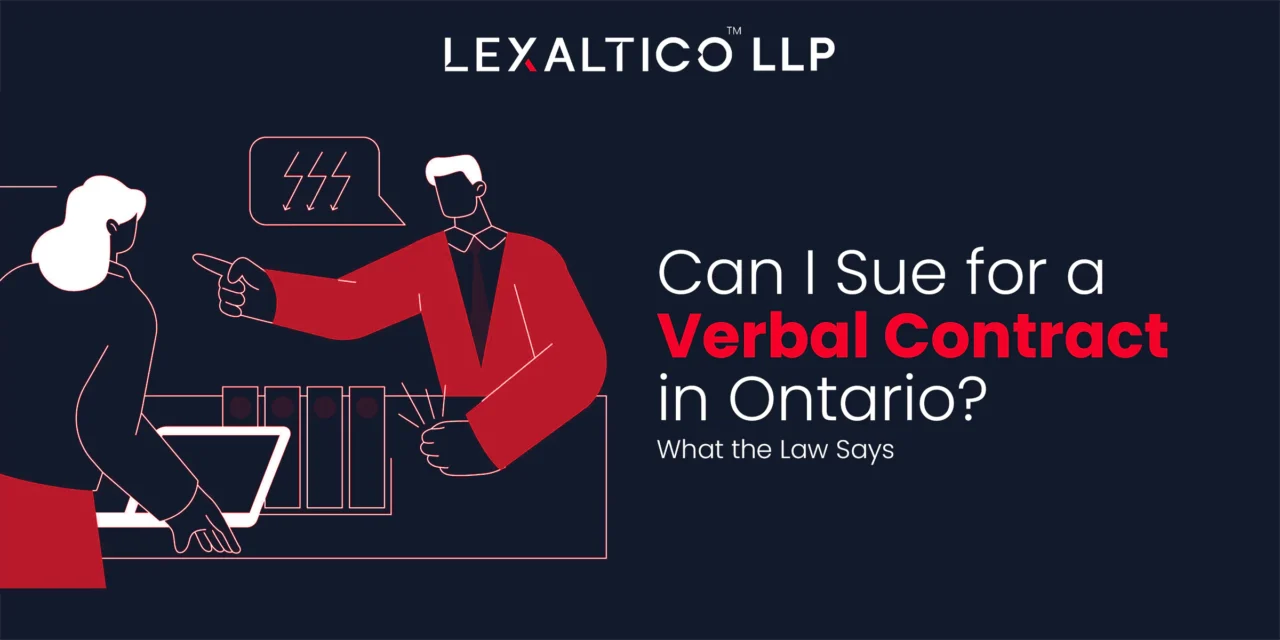Did you know that almost 60 percent of small business owners in Ontario have used verbal contracts at least once? That means more than half of them agreed without writing anything down.
Verbal agreements are common in daily life, too. You might shake hands on a job deal, promise to buy something, or make a payment arrangement with a friend. But what happens when someone does not follow through? Can you sue for a verbal contract in Ontario?
The short answer is yes, you can sue for a verbal contract, but it depends on the situation. The law in Ontario does recognize oral agreements, but there are certain rules and limits. Let’s break it down in simple terms.
What Makes Verbal Contracts Binding in Ontario
A verbal contract is enforceable in Ontario if it meets the same basic rules as a written contract. These rules are called the elements of a contract, and Canadian courts rely on them to decide if an agreement is legally binding.
The key elements are:
- Offer and acceptance: One person makes an offer, and the other accepts it. For example, “I will paint your house for $2,000,” and the other person says, “I agree.”
- Consideration: Each side must give something of value. This can be money, services, or even a promise to do something. Without consideration, there is no contract.
- Intention to create legal relations: Both sides must intend for the deal to be legally binding. If you promise to buy your friend a coffee, that is not a contract. But if you agree to pay a landscaper to cut your lawn every week, that is a contract.
- Capacity and legality: The people involved must be legally able to enter into a contract. That means they must be over the age of majority, mentally capable, and the agreement cannot involve something illegal.
If these elements are present, then a verbal agreement in Ontario can be legally binding.
When Verbal Agreements Do Not Work
Even though verbal contracts can be enforceable, there are times when the law requires the agreement to be in writing. This comes from something called the Statute of Frauds, a legal rule in Ontario.
It says that some contracts must be written down, such as:
- Contracts for the sale or transfer of land or real estate
- Leases for land that are longer than three years
- Agreements that cannot be finished within one year
- Most sales of goods can be valid even if they are only verbal; Ontario law does not require them to be in writing.
So, if you made a handshake deal to buy a house, that would not be enforceable unless it was written down.
Step-by-Step Guide to Suing for a Verbal Contract in Ontario

If you believe someone has broken a verbal contract, here’s how the process usually works in Ontario.
Step 1: Gather your evidence
Since you don’t have a written document, you will need to collect proof that the contract existed. This can include text messages, emails, receipts, invoices, or even witnesses who heard the agreement being made. Anything that shows the deal took place will help.
Step 2: Decide where to file your claim
In Ontario, the court you go to depends on the amount of money involved.
- If the claim exceeds $35,000, you must go to the Superior Court of Justice, which handles larger claims and can also grant equitable remedies like specific performance.
- If the amount is higher, you would need to go to the Superior Court of Justice, which is more formal and costly.
Step 3: File your claim
To start, you prepare a document that explains your side of the story. This includes what the verbal agreement was, how the other party broke it, and what you want as a remedy (usually money). You then file this claim with the court and pay a filing fee.
Step 4: Serve the other party
Once you file the claim, the other person must be officially notified. This is called “serving” the defendant. It means giving them a copy of the claim so they know they are being sued.
Step 5: Prepare for court
The other side will usually file a response. Both sides may then exchange evidence before the hearing. At this stage, keeping your evidence organized is very important. The judge will want to see proof that the agreement existed and that it was broken.
Step 6: The hearing or trial
In Small Claims Court, hearings are usually informal compared to higher courts. Each side tells its story, shows its evidence, and may call witnesses. The judge listens and makes a decision.
Step 7: Possible outcomes
The judge can order different results depending on the case. Often, the court will award damages, which means money to cover your losses. In some situations, the judge might order the other side to carry out the contract, although this is less common.
Step 8: Collecting your judgment
Winning a case does not always mean you get paid right away. If the other party refuses to pay, you may need to use enforcement options, such as garnishing wages (taking money directly from their paycheck) or placing a lien on their property.
Penalties and Risks of Breaking a Verbal Contract in Ontario

So, what happens if someone breaks a verbal contract in Ontario?
The courts take broken agreements seriously, even when they are not written down. If a judge finds that a valid contract existed and one side did not live up to their end, the following can happen:
1. Ordered to pay damages
The most common penalty is damages, which means money awarded to the innocent party. The court will try to put the person who lost out back in the position they would have been in if the contract had been honoured.
Let’s say if you paid for a service that was never delivered, the court may order the other party to refund you and possibly cover any extra costs you had to spend to fix the situation.
2. Forced to perform the contract
In some cases, the court may order what is called specific performance. This means the person who broke the contract must actually do what they promised.
For example, if the agreement was for something unique, like transferring ownership of a rare item or piece of land, money might not be enough to solve the problem. The court could then force the person to complete the deal.
3. Extra costs if you lose in court
If you sue someone over a verbal agreement and lose, or if you defend yourself and the judge rules against you, you may have to pay not only damages but also court costs.
These can include filing fees and sometimes a portion of the other side’s legal expenses. Ontario courts often award costs to the winning party to make up for some of their expenses.
Exceptions to the Rule
There are times when courts still enforce oral agreements about land or other matters that usually require writing. This happens through what is called the doctrine of part performance.
In simple terms, if one side has already started to act on the agreement, the court may say it would be unfair to deny the contract just because it was not in writing.
Example: if someone agreed verbally to sell land and the buyer took possession and made improvements, a court may enforce the deal under part performance. In Ontario, part performance is applied narrowly; the actions must clearly relate only to the land agreement.
Proving a Verbal Contract in Court
One of the hardest parts of suing over a verbal contract in Ontario is proving that the deal actually existed.
Since there is no paper trail, courts look at other forms of evidence, such as:
- Witnesses who heard the agreement being made
- Emails, text messages, or letters that confirm the terms
- Proof of payments, invoices, or services performed
- The behavior of the parties shows that they believed a deal was in place
Judges in Ontario will ask if there was a clear “meeting of the minds.” This means both parties understood the same terms and agreed to them. The contract must also have certainty of essential terms like price, scope of work, and timeline. If the terms are too vague, the court may say no contract exists.
Employment and Verbal Agreements
Verbal contracts also happen a lot in employment situations. Someone might be offered a job over the phone and accept it without signing paperwork. These agreements can be binding, but they can also lead to problems if details are not clarified beforehand.
Ontario employment law has safety nets for employees. If an employment contract is not written down, the Employment Standards Act fills in minimum terms like notice of termination and vacation pay. In disputes, courts interpret unclear terms against the employer, since they are in the stronger position and should provide clear written terms.
How to Protect Yourself When Making a Verbal Agreement
If you do find yourself entering a verbal agreement, here are some ways to make it stronger and easier to enforce if things go wrong:
- Speak clearly about all important terms like price, scope of work, and deadlines.
- Follow up with an email or text message summarizing what was agreed.
- Keep receipts, payment records, and any written notes.
- Ask a witness to be present when the agreement is made, if possible.
- Act consistently with the agreement so your behaviour shows you believe in the deal.
Quick Summary Table
| Type of Agreement | Can it be enforced verbally? | What to Watch For |
|---|---|---|
| Needs to be written unless there is a part performance | Yes | Must meet the elements of a contract |
| Land or real estate | Usually no | Needs to be written unless there is part performance |
| Employment | Yes | Courts may add protections under employment law |
| Long-term or complex deals | No | Safer to put it in writing to avoid confusion |
Final Thoughts
So, can you sue for a verbal contract in Ontario? The answer is yes, but with limits. Verbal contracts can be legally binding if they include the basic elements of a contract: offer and acceptance, consideration, intention to create legal relations, capacity, and legality.
Frequently Asked Questions
Verbal agreements can be legally binding in Ontario if they meet the basic elements of a contract, such as offer, acceptance, consideration, and intention to create legal relations. However, some agreements, like land deals, must be in writing under the Statute of Frauds.
Verbal employment agreements are recognized in Ontario, but courts may fill in missing terms using employment standards laws. Judges often rule in favour of employees if there is uncertainty in the agreement.
Verbal employment agreements are recognized in Ontario, but courts may fill in missing terms using employment standards laws. Judges often rule in favour of employees if there is uncertainty in the agreement.
You can rely on a verbal contract, but it is risky because they are harder to prove and terms may be uncertain. Ontario judges often stress that written contracts are the safest way to avoid disputes.
It means both parties clearly understood and agreed on the same terms of the contract. If one party thought something different, then there may not be a valid contract.
Courts accept witness testimony, emails, text messages, receipts, invoices, or actions that show the agreement was followed. Anything that supports the existence and terms of the deal can be useful evidence.
They fail when they involve matters that must be in writing, such as real estate or long-term contracts. They can also fail if the terms are too vague or if there is no clear intention to create legal relations.
A verbal agreement is enforceable if it includes a clear offer and acceptance, something of value exchanged, intention to be legally bound, and lawful subject matter. Courts also require certainty of essential terms like price and scope.
You can sue for a verbal agreement in Ontario, especially in Small Claims Court for disputes under $35,000. The main challenge is proving the agreement existed and its terms.
Disclaimer: The information provided in this blog is for general informational purposes only. It is not legal advice and should not be relied on as such.



